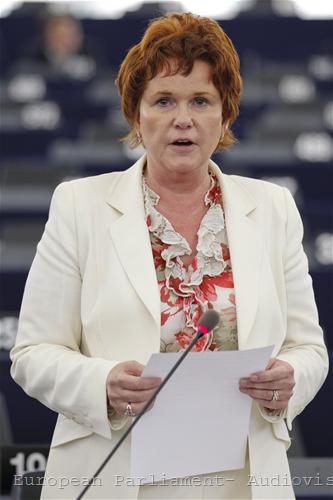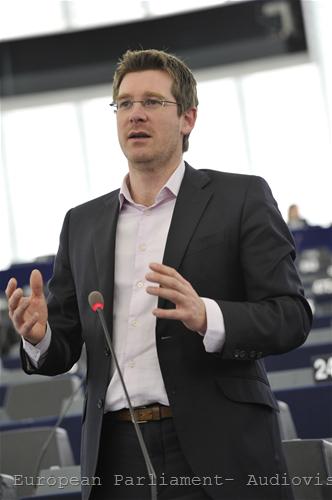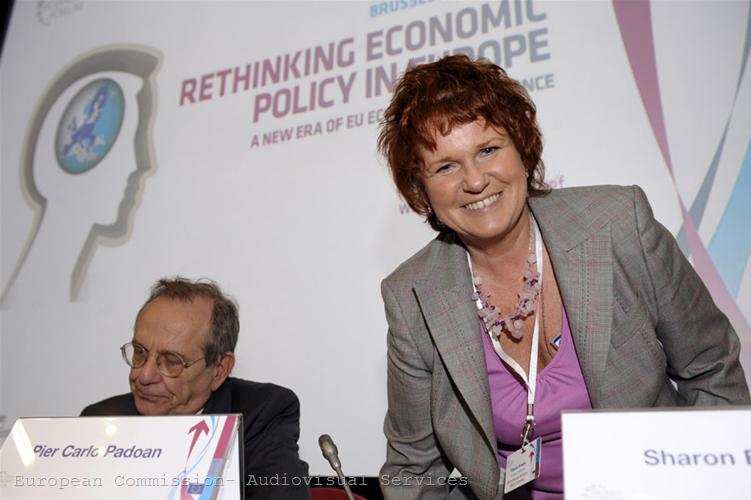European Commission: We must end "the Wild West" of the financial markets
Ralitsa Kovacheva, September 18, 2010
 Between the two parts of the phenomenal film "Wall Street" humanity experienced the rise and fall of virtual money. Buying and selling bonds that you do not even own, but earn from them, became the most attractive luxury gambling. People were easily securing a standard of living they dreamed of, thanks to the credit cards, forgetting what lies beyond the plastics and were spending widely the third mortgage. Financial markets became literally a parallel reality, where it is not necessary to create, produce, even work as long as you do winning bets on how others do it. Greed and fear became the main drivers of financial prosperity.
Between the two parts of the phenomenal film "Wall Street" humanity experienced the rise and fall of virtual money. Buying and selling bonds that you do not even own, but earn from them, became the most attractive luxury gambling. People were easily securing a standard of living they dreamed of, thanks to the credit cards, forgetting what lies beyond the plastics and were spending widely the third mortgage. Financial markets became literally a parallel reality, where it is not necessary to create, produce, even work as long as you do winning bets on how others do it. Greed and fear became the main drivers of financial prosperity.
But the crisis has shown that when there is a glitch in this apparent reality, just like in another emblematic film -" The Matrix ", a very unpleasant reality remains. The states thrust their hands deep into their pockets to pay for their tacit consent, which tolerated the waywardness of financial markets. And they said that this must end. How - by rules, transparency and supervision.
Shortly after the U.S., the European Commission has also presented its vision for financial regulation. The first step was the proposal to create a new pan-European supervisory structure embodied in the European Supervisory Authorities (ESAs) and, especially with regard to financial markets - the future European Securities and Markets Authority (ESMA). The second step are specific proposals on trade with certain financial instruments - OTC derivatives and short sales, submitted on September 15.
"No financial market can afford to remain a Wild West territory", European Commissioner for Internal Market and Services Michel Barnier said, presenting the proposal for OTC derivatives. These are a kind of bet on the future value or status of the underlying to which it refers (e.g. the development of interest rates or of a currency value, or the possible bankruptcy of a debtor). The problem with these transactions is that, unlike the stock market operations, there is a lack of any information who sells what, how and to whom.
"The absence of any regulatory framework for OTC derivatives contributed to the financial crisis and the tremendous consequences we are all suffering from", Michel Barnier stated, two years after the failure of Lehman Brothers, which marked the beginning of the crisis. At the end of December 2009, the size of the OTC derivatives market by notional value equalled approximately $615 trillion. It is not difficult to imagine the scale of the disaster, provided that there is "notional" trade with similar value.
Searching for information and transparency, the Commission proposes trade of OTC derivatives in the EU to be reported to central data centres, known as trade repositories. They, in turn, will communicate it to the future ESMA.
For the sake of greater certainty, the Commission proposes OTC derivatives that are standardised (i.e. they have met predefined eligibility criteria), such as a high level of liquidity, to be cleared through central counterparties (CCPs). CCPs (clearing houses) are entities that interpose themselves between the two counterparties to a transaction and thus become the “buyer to every seller”, as well as the “seller to every buyer” (in Bulgaria such entity is the Central Depository). The aim is to prevent default of a player to cause "chain reaction" that would endanger the entire system.
The second Commission's proposal refers to short sales - another way to get profit of something that you don't really possess. With short selling the seller does not own the bonds but is doing it with the intention of buying it back at a later point in time in order to deliver it, expecting to profit from the price margin. Naked short selling is where the seller has not borrowed the securities, or ensured they can be borrowed before settlement prior to the short sale.
"In normal times, short selling enhances market liquidity and contributes to  efficient pricing but in distressed markets, short selling can amplify price falls, leading to disorderly markets and systemic risks", Commissioner Barnier explained.
efficient pricing but in distressed markets, short selling can amplify price falls, leading to disorderly markets and systemic risks", Commissioner Barnier explained.
In spite of the decisions of some countries to restrict or even prohibit short selling, the Commission limits itself to rules for greater transparency and more rights of regulators to act in risky situations. Under the proposal, all share orders on trading venues have to be marked as 'short' (the so-called "flagging") if they involve a short sale, so that regulators would know which transactions are short. Investors will be required to disclose their significant net short positions in shares to regulatory authority where these are more than 0.2% of the issued share capital. And when these reach more than 0.5% of it, the information should be disclosed to the market participants.
As to the naked short sales, investors will be obliged in advance to borrow the instruments concerned, enter into an agreement to borrow or have an arrangement with a third party that the lending is secured.
In terms of regulation, the purpose of the proposal is to synchronize the rules which currently vary considerably in different European countries. National regulators receive clear authority in exceptional situations to temporarily restrict or ban short selling in any financial instrument, subject to coordination by ESMA (which should be operational from January 2011, if it receives the approval of the European Parliament). Under certain conditions, ESMA alone will be able to adopt provisional measures with a direct effect, restricting or prohibiting short selling.
With the proposed changes the regulatory authorities will be able to better identify potential risks to the stability of markets for government debt instruments, as they will receive information on short positions, including those acquired through credit default swaps of the states (derivative instruments which are considered a kind of insurance against the risk of default). This is particularly important in terms of the Debt Crisis, unleashed in Greece in the spring and threatening other countries in the euro area.
Commentators noted the obvious proximity of European proposals with the already adopted legislation in the U.S., which speaks of well synchronized common actions in the spirit of the agreements reached in the G20. The problem, however, the Financial Times commented, is that while the U.S. legislation is already a fact, the European procedure requires these proposals to be approved by the European Council and the European Parliament.
 The first parliamentary reaction came from the Greens, who accused the Commission that it “has failed to grasp the nettle and introduce EU measures to ban this nefarious practice [naked short sales]”. The largest group in Parliament - EPP, expressed full support for the Commission's proposals. The positions of the other groups, however, are still expected and the debates in Parliament are yet to come.
The first parliamentary reaction came from the Greens, who accused the Commission that it “has failed to grasp the nettle and introduce EU measures to ban this nefarious practice [naked short sales]”. The largest group in Parliament - EPP, expressed full support for the Commission's proposals. The positions of the other groups, however, are still expected and the debates in Parliament are yet to come.
Another uncertainty comes from the fact that the entire role in the implementation and control of new measures is a responsibility of ESMA - an institution that has not yet been approved by the EP and its construction is forthcoming. Because, as we have seen repeatedly, good intentions entirely depend on the practical implementation, in order not to lead in a wrong direction. Tighter regulation of financial markets meets support in general. Investment firms, quoted by the Financial Times, however, warn that the requirement for a centralised clearing will increase the price paid by long-term investors and ordinary people saving for pensions.
Clarification of the details is forthcoming. The question is as much financial as it is philosophical: has the crisis changed people's understanding of the meaning of profit and has it mad them less dependent on greed and fear? I think it hasn't. Which makes all attempts to impose rules just a temporary obstacle that human ingenuity will eventually learn to avoid. And so until we understand the priceless advice received by Charlie Sheen in the first film “Wall Street”: You should create, not resell what has been created by others. Old-fashioned, but real.
 | © European Parliament- Audiovisual Unit
| © European Parliament- Audiovisual Unit | © European Parliament- Audiovisual Unit
| © European Parliament- Audiovisual Unit | © European Union
| © European Union | © European Union
| © European Union | © REGIERUNGonline/Bergmann
| © REGIERUNGonline/Bergmann | © European Union
| © European Union | © European Parliament
| © European Parliament | © The Council of the European Union
| © The Council of the European Union | © European Parliament
| © European Parliament